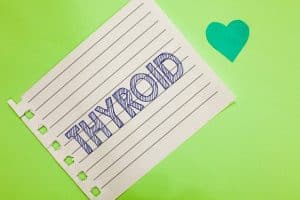How Do I Know If I Have a Thyroid Disorder?

What Is A Thyroid?
Your thyroid is a butterfly-shaped gland located in the base of your neck in front of your windpipe. This gland releases hormones that help regulate many of your body’s important functions, including your metabolism (the way your body uses energy). Hormones secreted by your thyroid regulate your heart rate, breathing, body weight, muscle strength, body temperature, and more.
What Are the Symptoms of a Thyroid Disorder?
The most common thyroid disorders are hyperthyroidism, which occurs when the gland makes too many hormones and hypothyroidism, which occurs when too little hormones are secreted. They can cause the following:
Hyperthyroidism
- Feeling moody, anxious, or irritable
- Hand trembling
- Feeling sensitive to heat
- Nervousness
- Hair loss
- Missed or light menstrual periods
- Swelling at the base of your neck
- Increased frequency of bowel movements
- Hair loss
- Losing weight without a known cause
- Fast or irregular heartbeat
Hypothyroidism
- Fatigue
- Difficulty sleeping
- Dry skin and hair
- Sensitivity to cold
- Depression
- Difficulty concentrating
- Joint and muscle pain
- Frequent heavy periods
- Constipation
- Memory issues
What Causes Thyroid Disorders?
Both hypothyroidism and hyperthyroidism can be caused by a number of different issues, including:
Hypothyroidism
- Autoimmune disease
- Overresponse to hyperthyroidism treatment
- Thyroid surgery
- Certain medications
Hyperthyroidism
- Autoimmune disease
- Goiter
- Excess iodine
- Pregnancy/birth
What Are the Risk Factors for Developing Thyroid Disease?
You may be more likely to have a thyroid disorder if one or more of the following applies to you:
Hypothyroidism
- Woman age 60 or older
- A family history of thyroid disease
- Presence of an autoimmune disease
- Treated with anti-thyroid medications, radioactive iodine or have received radiation to your neck or upper chest
- Thyroid surgery to remove all or part of your thyroid
Hyperthyroidism
- Woman age 60 or older
- Family history of Graves’ disease or hyperthyroidism
- History of other autoimmune disorders
- Pregnancy
- Taking iodine supplements
How Are Thyroid Disorders Diagnosed & Treated?
Hypothyroidism or hyperthyroidism can be diagnosed with a blood test that checks your hormone levels. Hyperthyroidism can also be diagnosed with other tests, including one that uses a radioactive tracer to determine how well your thyroid is working. Treatment is focused on restoring your thyroid’s hormone levels to their normal production. It can include:
Hypothyroidism
- Synthetic hormone medication
Hyperthyroidism
- Radioactive iodine treatment to disable the thyroid
- Medication to block hormone production
- Surgery to remove all or part of the thyroid
If you think you have any symptoms of a thyroid disorder, make an appointment today with Lakeside Allergy ENT. Our experienced ear, nose, and throat physicians can identify and treat any thyroid issues you may be having.






